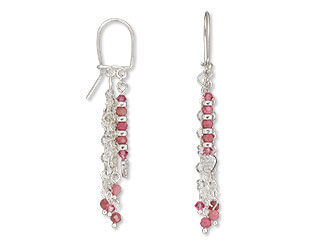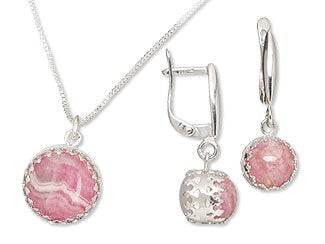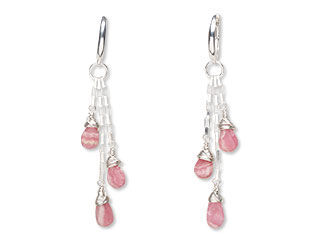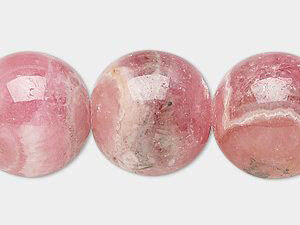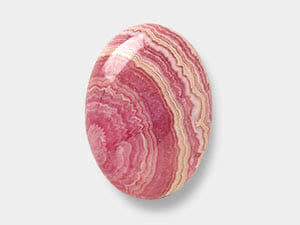Rhodochrosite Meaning and Properties
Rhodochrosite History
No gemstone is more luscious-looking and elegant than raspberry-colored rhodochrosite. Since a large amount of rhodochrosite formed as stalagmites in Inca silver mines abandoned in the 13th century, this gemstone is sometimes called Inca rose. Today, the world's main deposits are still found in the Inca regions of Argentina. Rhodochrosite is also the official state mineral of Colorado, no doubt partially due to the famous Sweet Home Mine located near Alma, Colorado, where rare, well-formed crystals have been found.
What are the Metaphysical Properties of Rhodochrosite?
Change comes. Sometimes we go out and find it. Sometimes, it finds us instead. Rhodochrosite is thought to welcome all change. It is said to urge us to pay attention to our hearts and those things we hunger for, bringing out the adventuresome qualities in us and giving us new chances. When change calls to you or falls into your life, rhodochrosite is believed to help you open your arms and embrace it. Rhodochrosite is also known as a stone of compassion, promoting selfless love.
What Chakra is Rhodochrosite?
Chakras are thought to be energy centers that align with various physical, emotional, and spiritual aspects of the self. Each one is believed to affect specific organs, mental states, and life experiences. Chakra bracelets provide a stylish and accessible way to keep healing gemstones close, helping to support balance and positive energy throughout your day. Rhodochrosite is linked to the heart chakra. A rhodochrosite chakra bracelet may support emotional healing, self-love and compassion, helping to release past wounds and open the heart to new connections.
Heart Chakra (Anahata) - Green
- Location: chest (breastbone)
- Represents: the union of male and female principles; ability to love
- Emotional issues: compassion; trust; forgiveness; compassion; complex emotions; tenderness; equilibrium; love
- Spiritual issues: devotion
- Physical issues: immune system; cardio-vascular system; lungs
- Gemstones: amazonite, aventurine, jade, malachite, peridot, rhodonite, rhodochrosite, rose quartz
What is Rhodochrosite Made From?
This light pink to red gemstone is a manganese carbonate identified by its distinctive color. As a variable chemical composition, sometimes the manganese can be replaced by iron, magnesium or calcium, resulting in changes to color and hardness. Rhodochrosite typically forms in cavities of metamorphic or sedimentary rocks. This gemstone does not grow in well-formed crystals often, making certain specimens incredibly rare and valuable. Rhodochrosite has three-directional perfect cleavage, which can make cutting this gemstone a difficult task at times.
- Mineral Information: Manganese carbonate
- Chemical Composition: MnCO3
- Color: Deep pink to raspberry red
- Hardness: 4 (Mohs)
- Specific Gravity: 3.30 – 3.70
- Refractive Index: 1.600 – 1.820
How Do You Clean Rhodochrosite?
In caring for this gemstone, it’s important to consider rhodochrosite properties such as its softness, which requires gentle care. To clean rhodochrosite, use cool water and a soapy, untreated cloth. Thoroughly dry rhodochrosite and any settings before storing or wearing. Protect rhodochrosite jewelry when it is not worn by storing in a soft pouch to avoid contact with other harder gemstones or materials that could potentially scratch or cleave the gem.
Rhodochrosite FAQ
Q: What is the difference between rhodochrosite and rhodonite?
A: Rhodochrosite and rhodonite are easy to mix up. Keep in mind that rhodochrosite, at 4 on the Mohs scale, is much softer than rhodonite, at 5-1/2 to 6-1/2. Rhodochrosite also has a more translucent appearance, often with white or pale banding, while rhodonite tends to be opaque with darker banding. Understanding rhodochrosite properties, such as its manganese carbonate composition, helps gemologists identify and classify this striking mineral.
Q: Is rhodochrosite treated or enhanced in any way?
A: Rhodochrosite is typically left in its natural state and is rarely treated or enhanced. Its vibrant pink to deep rose-red color occurs naturally, and most specimens are used without any modifications. Because the stone is relatively soft and sensitive to heat and chemicals, common gemstone treatments like heating or dyeing are not practical. Occasionally, lower-quality pieces may be stabilized with resin for durability, but in general, rhodochrosite is valued for its untreated, natural beauty.
Q: Can you carve rhodochrosite?
A: Due to its three-directional cleavage, rhodochrosite is challenging to facet. However, its softness makes it well-suited for carving and shaping into ornamental pieces.
Q: Where is rhodochrosite commonly found?
A: Rhodochrosite is typical found in Argentina, Colorado and Romania.
Q: Is rhodochrosite a good stone to use in a bracelet?
A: Because rhodochrosite is a softer gemstone, it's best suited for earrings and necklaces, where it's less likely to be exposed to rough wear.
Q: How did rhodochrosite get its name?
A: Rhodochrosite gets its name from the Greek words for “rose” (rodon / ροδον) and “coloring” (chrosis / χρωσις).
Designing with Rhodochrosite
Since rhodochrosite has a low hardness and distinct cleavage, it's best to use this gemstone in jewelry designs that will not receive accidental blows or impact. Necklaces and earrings are safer bets than rings and bracelets. While some may think the pink hue of rhodochrosite pegs this gemstone as a stone for women's jewelry only, the warm color variations and red undertones are perfect for unisex and men's jewelry as well. Temper the pinkish hues with darker materials such as black onyx or Hemalyke™. Or play up the pink by creating an analogous color scheme with other pink and light-colored gemstones such as morganite, rose quartz and rhodonite.
A Few Design Inspirations to Get You Started
If you're a fan of gemstone jewelry, you're in for a treat! Join FMG jewelry designer Rose as she walks you through the simple steps to create a gorgeous rhodochrosite necklace and matching earrings. You'll be amazed at how easy it is!

Shop for Rhodochrosite
**Please note that all metaphysical or healing properties listed are collected from various sources. This information is offered as a service and not meant to treat medical conditions. Fire Mountain Gems and Beads® does not guarantee the validity of any of these statements.
How did you like this resource? Your feedback helps us provide resources that matter to you most.
Copyright Permissions
All works of authorship (articles, videos, tutorials and other creative works) are from the Fire Mountain Gems and Beads® Collection, and permission to copy is granted for non-commercial educational purposes only. All other reproduction requires written permission. For more information, please email copyrightpermission@firemtn.com.

